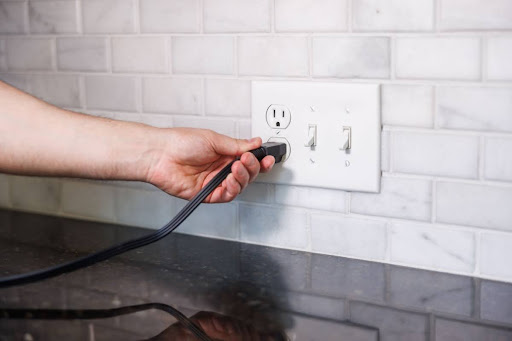
The kitchen is where life happens. It’s where we brew our morning coffee, prep school lunches and gather for family dinners. But with all the cooking, cleaning and multitasking, it’s easy to overlook the potential electrical hazards lurking in this busy space.
Between water, heat and a slew of appliances, the risk of electrical shock is real. A few simple precautions can make your kitchen much safer. Let's review ten practical tips for preventing electrical shocks in the kitchen to keep your family safe.
1. Keep Water and Electricity Apart
Water and electricity are a dangerous mix. One of the most crucial tips for preventing electrical shocks in the kitchen is to keep water and electricity separate.
Always dry your hands thoroughly before handling any electrical appliances or switches. Be cautious with spills — wipe them up promptly, especially around outlets and cords. Avoid placing appliances like blenders or toasters near the sink, and never use them on wet countertops. Remember, even a small amount of moisture can increase the risk of an electrical shock.
2. Use GFCI Outlets
Ground Fault Circuit Interrupter (GFCI) outlets are designed to protect you from electrical shocks by shutting off power when they detect a fault. These outlets are especially important in areas where water is present, like kitchens and bathrooms.
If your kitchen doesn't have GFCI outlets, it's time to consider an upgrade. You’ll also want to regularly test your GFCI outlets by pressing the "test" and "reset" buttons to confirm they're functioning properly.
3. Inspect Cords and Plugs Regularly
Over time, cords can become frayed or damaged, exposing wires and increasing the risk of shocks. Make it a habit to check the cords and plugs of your kitchen appliances. If you notice any signs of wear and tear, replace them immediately. Avoid using appliances with damaged cords, and never attempt to repair them with tape or other temporary fixes.
4. Unplug Appliances When Not in Use
Leaving appliances plugged in when they're not in use can pose a risk, especially if they're near water sources. Unplug items like toasters, coffee makers and mixers after each use. Not only does this reduce the risk of electrical shocks, but it can also help save energy and extend the life of your appliances.
5. Avoid Overloading Outlets
Plugging too many appliances into a single outlet can overload the circuit, leading to overheating and potential shocks. One of the most important tips for preventing electrical shocks in the kitchen is to use one appliance per outlet whenever possible.
Additionally, avoid utilizing extension cords or power strips for high-wattage appliances like microwaves or refrigerators. If you find yourself constantly needing more outlets, consider having an electrician install more.
6. Keep Appliances Away From Heat Sources
Placing electrical appliances too close to heat sources like stoves or ovens can damage their cords and components. Ensure that appliances are positioned at a safe distance from heat to prevent melting or degradation of their electrical parts. This simple step can go a long way in maintaining the safety and longevity of your kitchen gadgets.
7. Store Appliances Safely
Store your appliances in a dry, safe place away from the edge of countertops when you're not using them. This prevents them from being accidentally knocked into sinks or onto the floor, which could damage them or expose you to electrical hazards. Proper storage also keeps cords from becoming tangled or frayed.
8. Educate Family Members
Make sure everyone in your household, including children, understands the importance of electrical safety in the kitchen. Teach them not to use appliances with wet hands, to unplug devices properly by pulling the plug (not the cord) and to report any damaged cords or outlets. Fostering a culture of safety at home can prevent accidents before they happen.
9. Use Appliances as Intended
Always follow the manufacturer's instructions for using kitchen appliances. Using devices in ways they weren't intended can lead to malfunctions and increase the risk of shocks. For example, don't use a blender to crush ice unless it's designed for that purpose and never operate appliances with missing parts or safety features.
10. Schedule Regular Electrical Inspections
Regular electrical inspections can identify potential hazards before they turn into serious problems. Consider scheduling a whole-home electrical safety inspection in Pittsburgh with Gillece Services. Our electricians can assess your kitchen's electrical system, recommend upgrades and address any safety concerns.
Knowing how to avoid electrical shock in the kitchen is key to keeping your home safe. If it's been a while since your last inspection, it might be time to call the electricians at Gillece to take a look.
Ready to Make Your Kitchen Safer in Pittsburgh, PA?
By following these tips for preventing electrical shocks in the kitchen, you can make your home safer for your family. Remember, when it comes to electricity, it's better to be safe than sorry.
If you're in the Pittsburgh area and need professional electrical services, turn to Gillece Services. Our electricians will treat your home as if it were their own and provide high-quality services. Your safety is our top priority.
Now that you know how to avoid electrical shock in the kitchen, don't wait for an accident to happen. Schedule your services with our Pittsburgh electricians today!





